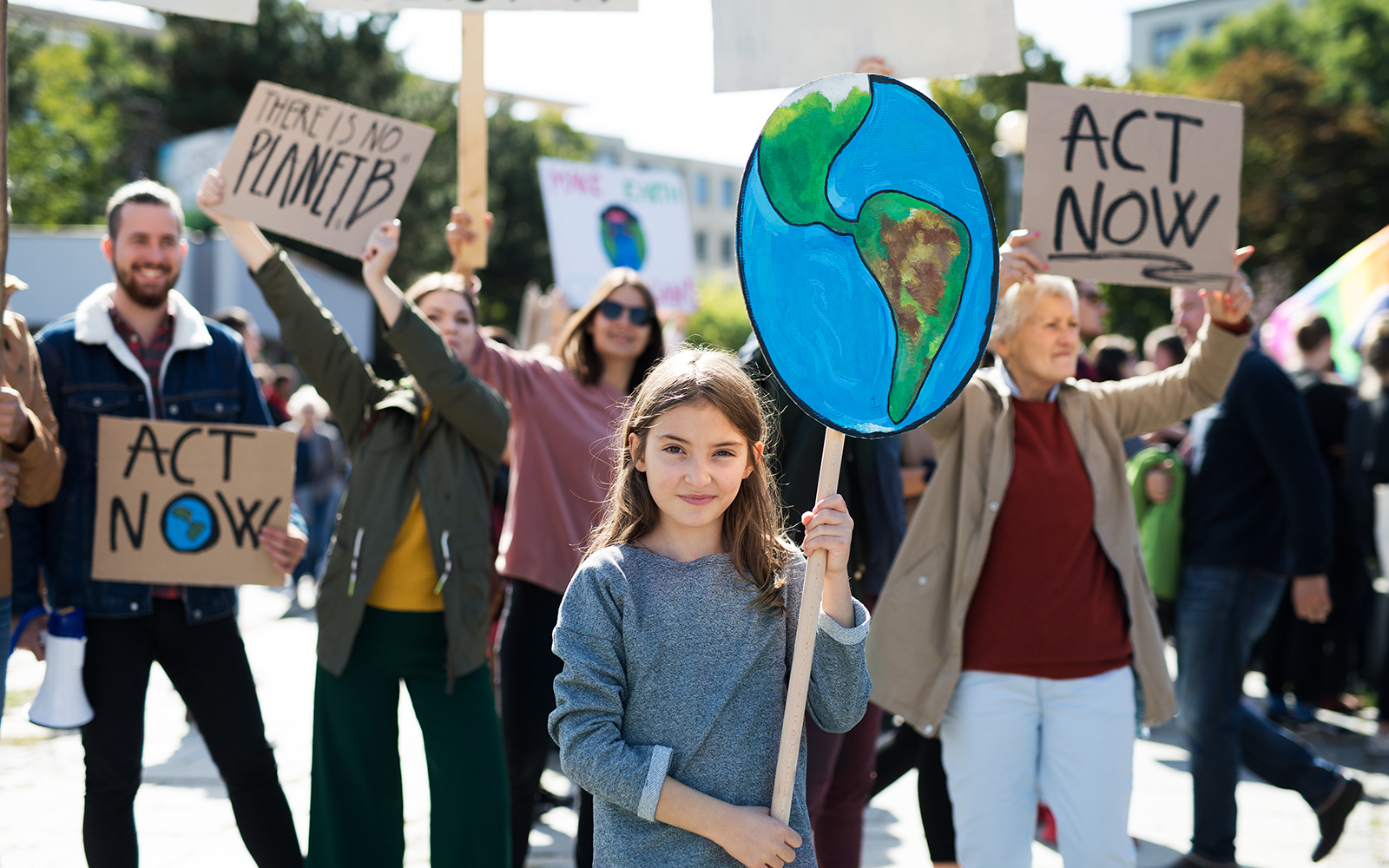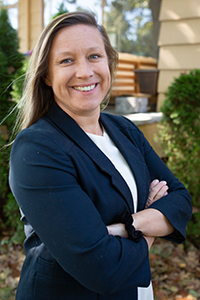
Human Rights, Business Practices — and a Generation Ready to Make a Difference
During the 10 years that Rachel Chambers worked as a barrister, practicing employment and discrimination law in the British courts, she occasionally wore formal attire: a full-length robe and a white, horsehair wig.
No wig is required in her role today as a UConn postdoctoral fellow and professor, where her international legal experiences, recent work for the United Nations, and passion for social justice prepared her to teach BLAW 3252: “Corporate Social Impact and Responsibility.”
The course is typically filled to capacity, with a waiting list. Students come from multiple disciplines including business, human rights, political science, journalism and more. The course explores the social impact and human rights implications of multinational enterprises. Students analyze the regulatory environment, governance gaps, and other corporate-citizenship factors from the environment to investment priorities to consumer power.
Senior Shreya Murthy, a triple major in finance, human rights and criminology, said the class was among her favorites.
“This class really teaches students how to think differently about business and its impact on the world,” Murthy said. “Dr. Chambers teaches in a way that resonates with students and shows them how the field of business and human rights has evolved over the last decade and how it continues to evolve through case studies, interactive projects, and guest speakers.”
“Personally, this class will always be special to me as it pointed me toward a career path that I had never thought possible or even considered and opened up new opportunities at the university and beyond,” she said.
Chambers recently agreed to an interview to highlight the importance of her work.
 Q: What’s one concept that you hope your undergraduate students will embrace when they finish your class?
Q: What’s one concept that you hope your undergraduate students will embrace when they finish your class?
RC: I want students to understand the human rights ‘governance gap’ that global businesses are able to exploit, and to embrace the idea that we as consumers and investors have a role to play in pushing for socially responsible business.
Q: Are you optimistic that this generation of college student will make a difference on issues such as fair labor, environmental protection, and other topics? If so, why?
RC: Students start my class with an in-built expectation that businesses should be performing better on social and environmental issues. They have come of age as climate change has become the defining issue of our time. They are very much aware of social concerns such as modern slavery in global supply chains. And they are cynical about corporate PR and marketing on sustainability issues.
I am cautiously optimistic about this generation making a difference. The reason for my caution is that countervailing forces remain strong, such as rampant consumerism. But I’m hopeful that this generation takes up these issues when it joins the workforce and effects change from a position of strength, conviction, and influence.
Q: Has COVID-19 impacted corporate social responsibility goals and, if so, how?
Yes, the pandemic has brought out the best and worst in business.
Companies are under heightened scrutiny since COVID-19, and expectations of companies have correspondingly grown. At one end of the spectrum, we have seen companies taking extraordinary steps to assist in the pandemic. For instance, firms here in Connecticut have pivoted from production of their usual inventory to production of personal protective equipment. Some companies have used their best efforts to honor commitments to their global suppliers.
At the other of the spectrum, there are companies that have cancelled contracts with global suppliers, even after products have already been manufactured, shipped and received. For people at the other end of the supply chain, working on the production line, the repercussions are catastrophic. There are also companies that have failed to offer sufficient protection of workers right here in the United States. Amazon recently revealed that over 19,000 of its workers had tested positive for COVID-19.
Q: Tell me about your background. How did you become interested in this field?
RC: Corporate social responsibility (CSR) has been a guiding thread through my career. I studied a very traditional law course as an undergraduate at Oxford and wasn’t really sure that law was for me initially. So, I ended up working for a CSR organization – the International Business Leaders Forum – in my first post-graduation role. I learned through that job about legal and policy questions concerning business, human rights, and corporate accountability, and became hooked on these subjects.
I decided to take law forward into a professional career and practiced as a barrister for the best part of 10 years, mainly in the fields of employment and discrimination law. Throughout this time, I maintained my interest in the regulation of multinationals, global supply chains, and human rights – I did a research sabbatical and an LLM – but I didn’t find a way to incorporate these subjects into my legal practice.
In 2013, I decided to take a big step and pursue a PhD in business and human rights. I began teaching shortly after that, as an adjunct, at the University of London’s School of Oriental & African Studies (SOAS). Our family moved to the New York area in 2017, and that gave me the opportunity to finish my doctorate before joining the UN Global Compact as a consultant, working with businesses on human rights challenges. In 2018, I was recruited to join UConn’s Human Rights Institute as a postdoctoral fellow in business and human rights.
Q: How would you describe your teaching style?
RC: I have always enjoyed the interactivity of the classroom and I definitely embrace an informal and open style of teaching, encouraging as much student engagement as possible.
Teaching online presents a challenge because it isn’t the natural habitat for interactivity. I have found different ways to break the ice with my students including through one-to-one meetings via teleconference and small group work in breakout rooms.
As a member of the Governance Committee of the Teaching Business and Human Rights Forum – a network involving more than 350 professors globally -– I have been actively engaging with my peer instructors, nationally and internationally, since the start of the pandemic. I help shape weekly teleconferences about online teaching pedagogy and co-organize webinars on hot topics in our field. It was during one of the weekly calls that I learned about using a Jeopardy!-style game as a learning tool, which inspired me to use it in a recent class.
Q: You mentioned that few universities have invested in sustainability like UConn has. Can you elaborate?
Through the work of the President’s Committee on Corporate Social Responsibility and Kyle Muncy, Director of Strategic Partnerships and Business Development, UConn is a frontrunner among universities on social responsibility and human rights. The university challenges its suppliers and counterparts to move the needle on social issues. Through the work of UConn’s Business and Human Rights Initiative we have excellent speakers come to campus; as an example, one of the architects of the socially responsible investment movement, Amy Domini.
This may come as a surprise to many students, but UConn is also one of very few comparable institutions to offer courses at the intersection of business and human rights, including classes such as this one on corporate social responsibility.
I was thrilled when UConn President Tom Katsouleas joined my class in Spring 2020, spoke to the students, answered their questions, and listened to the class discussion. This underscored to me the deep institutional commitment to the teaching of CSR and business and human rights. It also meant a great deal to my students, who were facing challenging circumstances with COVID-19. It gave us something to look forward to!
Q: Do you have a favorite expression about corporate social responsibility?
When talking about global businesses, we often hear, “with great power comes great responsibility,” and it’s true, never more so than in this tumultuous year.